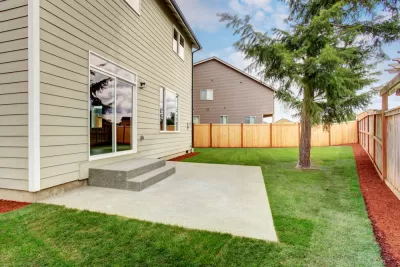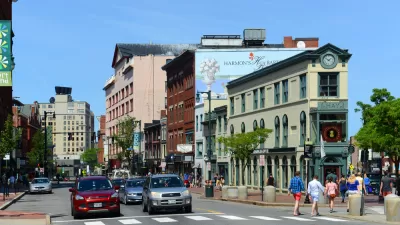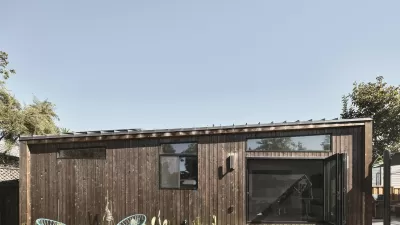Less restrictive permit laws and pre-fabricated, pre-approved building options are spurring more homeowners to build backyard additions.

Since the state passed regulations loosening restrictions on accessory dwelling units (ADUs), backyard homes have become a growing business in California, where housing is scarce and land is often prohibitively expensive. "California homeowners built some 12,000 backyard flats in 2019 — more than double the number permitted just two years earlier and a ten-fold increase since the state passed its preemption laws," writes Kriston Capps in Bloomberg CityLab.
With the rise of pre-fabricated, pre-approved houses made available by companies like Bay Area-based Abodu, building a backyard accessory unit is becoming easier than ever. "Its smallest offering, a 340-square-foot studio, starts at $189,000 — significantly cheaper than a similar stick-built house, according to CEO and co-founder John Geary. For select cities in California, Abodu promises that it can finish an ADU, from permitting through construction, in as little as 30 days." Cities like Los Angeles and San Jose have pre-approved designs such as Abodu's in an effort to streamline permitting for homeowners.
While construction slowed during 2020, "ADUs could be a rare bright spot in California and a few other places," with permit applications for "granny flats" continuing to increase. With 51% of ADUs serving as long-term rentals, the trend could help increase the availability of affordable rental housing in formerly single-family neighborhoods.
FULL STORY: How California Set Off a Backyard Apartment Boom

Maui's Vacation Rental Debate Turns Ugly
Verbal attacks, misinformation campaigns and fistfights plague a high-stakes debate to convert thousands of vacation rentals into long-term housing.

Planetizen Federal Action Tracker
A weekly monitor of how Trump’s orders and actions are impacting planners and planning in America.

San Francisco Suspends Traffic Calming Amidst Record Deaths
Citing “a challenging fiscal landscape,” the city will cease the program on the heels of 42 traffic deaths, including 24 pedestrians.

Defunct Pittsburgh Power Plant to Become Residential Tower
A decommissioned steam heat plant will be redeveloped into almost 100 affordable housing units.

Trump Prompts Restructuring of Transportation Research Board in “Unprecedented Overreach”
The TRB has eliminated more than half of its committees including those focused on climate, equity, and cities.

Amtrak Rolls Out New Orleans to Alabama “Mardi Gras” Train
The new service will operate morning and evening departures between Mobile and New Orleans.
Urban Design for Planners 1: Software Tools
This six-course series explores essential urban design concepts using open source software and equips planners with the tools they need to participate fully in the urban design process.
Planning for Universal Design
Learn the tools for implementing Universal Design in planning regulations.
Heyer Gruel & Associates PA
JM Goldson LLC
Custer County Colorado
City of Camden Redevelopment Agency
City of Astoria
Transportation Research & Education Center (TREC) at Portland State University
Jefferson Parish Government
Camden Redevelopment Agency
City of Claremont





























